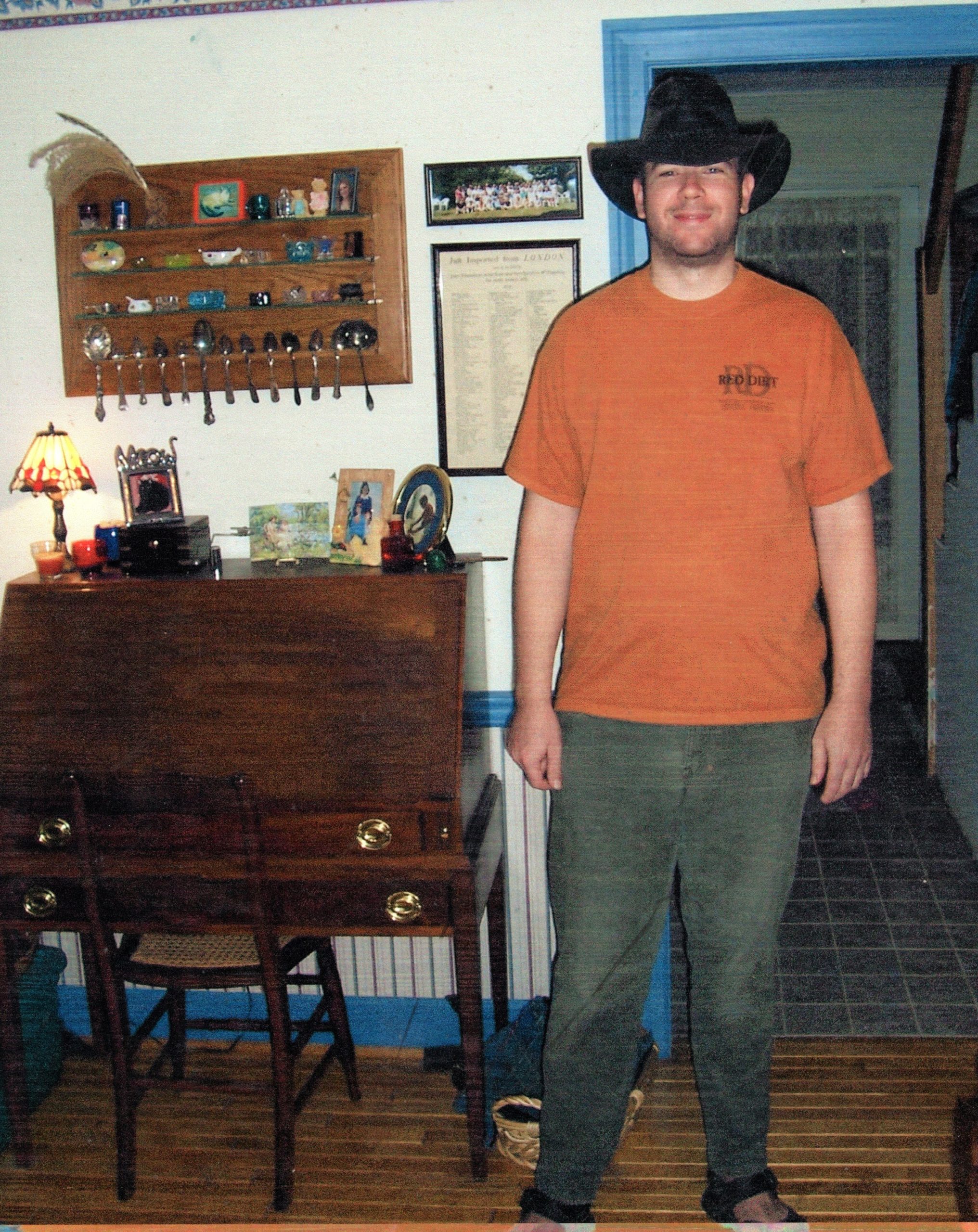review by Paul McDonald
D.S. Poorman
Before the Grave
Radial Books
On Jan. 18, 2019, author and poet Dave Baker, writing under the pen name of D.S. Poorman, passed away at the relatively young age of 48. It’s always sad when someone so young dies, but in Poorman’s case, Kentucky lost a rising and powerful literary voice. His website, dspoorman.com, lists his occupations as wood craftsman, poet, book smith, and novelist. Over the course of his lifetime, Poorman had written three published novels: Macky Dunn’s got Nothing to Lose, Once Removed, and Somewhere There’s a Place. He also penned several unpublished works, unless you want to count that Poorman had them all meticulously printed and bound in wooden covers roughly one inch thick. One of the books, The Largest Poetry Book in the World, is over 7 feet tall, which is one of the many reasons he can righteously lay claim to the title of book smith. Several of his wooden books are now being housed in the University of Louisville’s Rare Books Collection.
The wood bound novels are reminiscent of The Book of Kentucky “…an artistic venture intended to capture a moment in Kentucky Literary History…”[whose quote is this?] The Book of Kentucky was edited by Poorman and his longtime friend Kent Fielding, then crafted by metal artist Joe Werth into an 11″ x 17″ rusted steel book filled with sixty pages of card-stock linen paper. Each page included an original work by Kentucky authors James Still, Ed McClanahan, Wendell Berry, Jeffrey Skinner, George Ella Lyons, and Nikki Finney to name only a few. Like Poorman’s wooden books, The Book of Kentucky is also housed at the University of Louisville’s Ekstrom Library.Sometime after 2005, Poorman began to have health problems. He was frequently hospitalized for various illnesses, but it wasn’t until March of 2017 that he learned he had lung cancer. He was in and out of the hospital until he died at home in 2019.
Poorman left behind several books in his personal library that included titles by Kentucky poet James Baker Hall, poet and novelist Wendell Berry, and Irish Nobel Laurate Seamus Heaney. Also left behind were several hundred unpublished poems languishing on a computer drive. His friend Kent Fielding decided to take on the monumental task of curating and editing this trove down to roughly 75 poems that became the book, Before the Grave.
As the title obviously suggests, Poorman was contemplating his approaching death, and in doing so, writing his personal memoir. There had been a lot of heartache in Poorman’s life, and he wasn’t shy about writing about it. Poetry was probably the only way he could take a knife to his experience and cut away the pain to find the redemption he knew was there.
The first section is simply called “Personal” and contains poems about his childhood and adolescence. This was a childhood that had its joy, such as in the poem “Running” where he writes of finding his “best friend running cross-country in high school.” He talks of running with his brother in Seneca Park every Saturday and one night the two of them watching a meteor storm, their father telling them “…they should run like hell if he actually heard one ripping through the atmosphere.” A memory of a time when he felt strong and like the “light of heaven was chasing you without a sound.”
There is also the poem, “Personal,” that has a certain echo of Allen Ginsberg’s “Personals Ad,” but where Ginsberg used a certain wry humor, Poorman uses the ad to reveal the scars he had to live with:
Took one-way ticket to sexuality, when
three-foot-four, seventy-two pounds,
just turned eleven years old,
and suffered bedroom abuse from old neighbor.
Slept with anyone I could charm from their clothes.
Until thirty-four years old when suddenly
realized what had happened, and
the vast ocean of the human heart
opened before me like the clapped shut wings
of a hidden butterfly stirred awake by a gentler breeze….
Can meet for coffee, devoid of pretensions,
will not try to impress, great understander of pain…
The sexual abuse that Poorman endured informs a lot of his poetry; most vividly and with a lot of rage in the poem “Kickballs and Overgrown Lawns.” The poem starts with a description of his self-loathing when he writes:
Only the most-vile depravations can wake my lust
Or turn my white skin purple.
When I close my eyes,
Whores come to my bedside to be slapped,
And hordes of faceless men
Degrade them one by one,
My erection standing, wide of eye…
As the poem continues, he realizes he’s been damaged by the experience. The child that was chased by heaven is also the child who lost a part of himself he can’t get back. In the poem “Winter” he writes about how he dealt with his pain and how it nearly killed him:
The worst I’d say it ever got,
minus the weekend when I couldn’t move
through all the empty bottles,
(like an avalanche of smooth glass),
was the night I passed out driving home
and woke up in an exploding ditch…
But I got out and walked home,
a long distance through sweet bark and leaf.
There were drinks to be had yet.
Six more years and loneliness like a pet fish….
Eventually, Poorman knew what he had to do, and sobriety brought him a new awareness, as he describes in the poem “Sober.” When he stopped trying to numb his pain, he was able to notice things for the first time, such as how “the river does not need to see it’s way…” and how “the light is but a dust in the vast darkness/ that once could not get in.” The light being a sense of hope or healing.
One thing that Poorman could never be accused of is brevity. That and writing so descriptively that the reader is either overwhelmed or passed out from sensory overload. However, it needs to be said that Poorman was not some hack writer who thought he could write. Poorman was good. Often, he was brilliant. Poorman immersed himself so much in the task at hand that he probably didn’t know how to pull it back.
This book should not be read in one sitting. The reader should take their time. There is a lot here and it’s not meant to be read as much as it is to be absorbed. Each one of the sections could be an excellent chapbook considering the poetic weight they carry. They are:
•Personal
•The Weight of Broken Glass
•Kickballs and Overgrown Lawns
•The Dance of The Black Wasps
•No Bottom
•Distorted History
•Flame
“The Dance of the Black Wasps,” the section and the poem, exhibits a wild sense of fire and surrealism. The section “No Bottom” contains the poem, “State Fair,” which reads more like a short story and could possibly be developed into a longer work. “Distorted History” features a Mother’s Day homage that would make any mom proud to have Poorman be her son.
Finally, we get to the section called “Flame,” consisting of 12 poems Poorman wrote just days before he passed away. “Flame” is constructed like a symphonic work, each poem moving like a rising crescendo with titles like “After the Hospital,” “An Immense Waiting,” “Sheer White,” “Skeleton,” “Veins,” “Veins II,” and “Veins III” allowing us to experience his hospitalization and acceptance toward the inevitable. The inevitable being the powerhouse poem “Before the Grave.”
Kent Fielding should be proud of the work he’s done to pull this book together. Before the Grave is a magnificent work from a poet and author who left us too soon but leaves behind a rich legacy for future generations to engage, ponder, and enjoy.
 Paul McDonald is a middle-aged poet and writer who works with inmates and convicts who suffer from drug addiction and mental illness. He is in the process of shaking the depression the pandemic lockdown brought on and is extremely grateful for the opportunity to review D.S. Doorman’s book. He lives in Louisville with his cat Haiku.
Paul McDonald is a middle-aged poet and writer who works with inmates and convicts who suffer from drug addiction and mental illness. He is in the process of shaking the depression the pandemic lockdown brought on and is extremely grateful for the opportunity to review D.S. Doorman’s book. He lives in Louisville with his cat Haiku.

